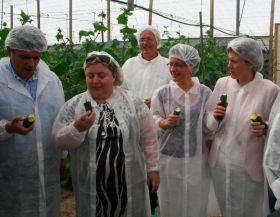
The two Spanish companies named in the E.coli cucumber alert have claimed that the contamination is unlikely to have taken place on Spanish soil, insisting all tests carried out to date have shown no trace of the bacteria.
Málaga-based Frunet Bio and cooperative group Costa de Almería, which has its headquarters in Roquetas del Mar, Almería, have told Eurofruit of their belief that the contamination with E.coli happened on arrival in Germany or during transportation.
Both companies said they were fully cooperating with the Spanish authorities in addition to carrying out their own investigations, but revealed that no contamination had been detected in the soil, water, pallets or packhouses used by their allied growers.
Frunet and Costa de Almería were also quick to point out that to date there have been no reports of any linked illnesses in Spain or France, where many products from the production lot named by the European Commission were also distributed.
In a letter to clients seen by Eurofruit, Costa de Almería has sought to ease buyers’ concerns by detailing the tests already carried out at its Almería production and packing sites, which have detected no sign of E.coli.
Writing to buyers, Costa de Almería’s head of quality control, Immaculada Reyes Cano, said that the named lot, number L 1803 TD-TF, had been part of a shipment delivered to several other destinations with no reports of any problems.
Furthermore, she said that separate tests carried out by the company and the Spanish sanitary authorities on affected production sites, water, soil and the products themselves had so far all tested negative for E.coli.
Ms Reyes stated Costa de Almería's belief that contamination was likely to have taken place at a later stage in the transportation process or on arrival in Germany; an opinion that she said was echoed by the Spanish authorities’ own assessment.
Speaking to Eurofruit, Costa de Almería’s Noelia Medialdea said: “We always carry out multiple tests on all the products and the contamination has not happened in Almería.
“We’re carrying out tests in association with a laboratory in Galicia and at the moment all of these have come up negative.
“The Germans have accused our company, another company in Málaga and the whole (Spanish) sector without any proof.”
Ms Medialdea said Costa de Almería had for the moment halted production of cucumbers, one of its most important export products, in mid-campaign.
“The packhouse is full of products and all of that will have to be destroyed,” she added.
A spokesman for the other affected company, Frunet Bio, told Eurofruit that all test samples taken as part of its own investigation and that of the Spanish authorities had also found no traces of the bacteria.
“We are quite convinced that Frunet, as a company, is absolutely clean and nothing could have happened there,” he said.
“We are now checking the logistics and looking at what happened between the departure of the products from Málaga and their arrival at the market in Hamburg.”
The spokesman said the cucumbers that had tested positive for E.coli had travelled in four different trucks, adding that one pallet of cucumbers was reported to have been spilled on the floor of the market on arrival.
“We exported 40 tonnes of cucumbers between (the affected dates of) week 17 and week 21 and most of it to France, and no cases of illness were reported there or in Spain, so we believe something must of happened in Hamburg,” he said.
The spokesman added that one of Frunet’s major German clients, Rewe, had hired quality control company Q&S to carry out an independent investigation, but noted that after testing the products, water, soil, pallets and production sites, no signs of the deadly bacteria had been found.
Official support
In a public show of support from the two Andalusian companies, the Spanish region's minister for agriculture, Clara Aguilera, yesterday (30 May) visited one of Frunet's organic cucumber production sites, near the town of Pechina.
Before members of the press, the minister ate a recently-harvested raw cucumber and urged consumers to keep eating the product, which she said benefited from a food safety and quality control system that was 'functioning without problems'.






No comments yet